PSY 101: An Overview of the Four Perspectives of Psychological Science
VerifiedAdded on 2019/10/18
|7
|1747
|221
Essay
AI Summary
This essay delves into the four major perspectives of psychological science: psychodynamic, behavioral, cognitive, and humanistic. The psychodynamic approach, pioneered by Sigmund Freud, emphasizes unconscious forces and early childhood experiences. The behavioral approach, championed by B.F. Skinner, focuses on environmental stimuli and conditioning through reinforcement and punishment. The cognitive approach highlights the role of internal thought processes, expectations, and emotions in shaping behavior. Finally, the humanistic approach, advocated by Carl Rogers, underscores the inherent goodness and potential of individuals, emphasizing self-actualization and personal growth. The essay concludes that each perspective offers unique insights into human behavior, and integrating their strengths provides a more comprehensive understanding.
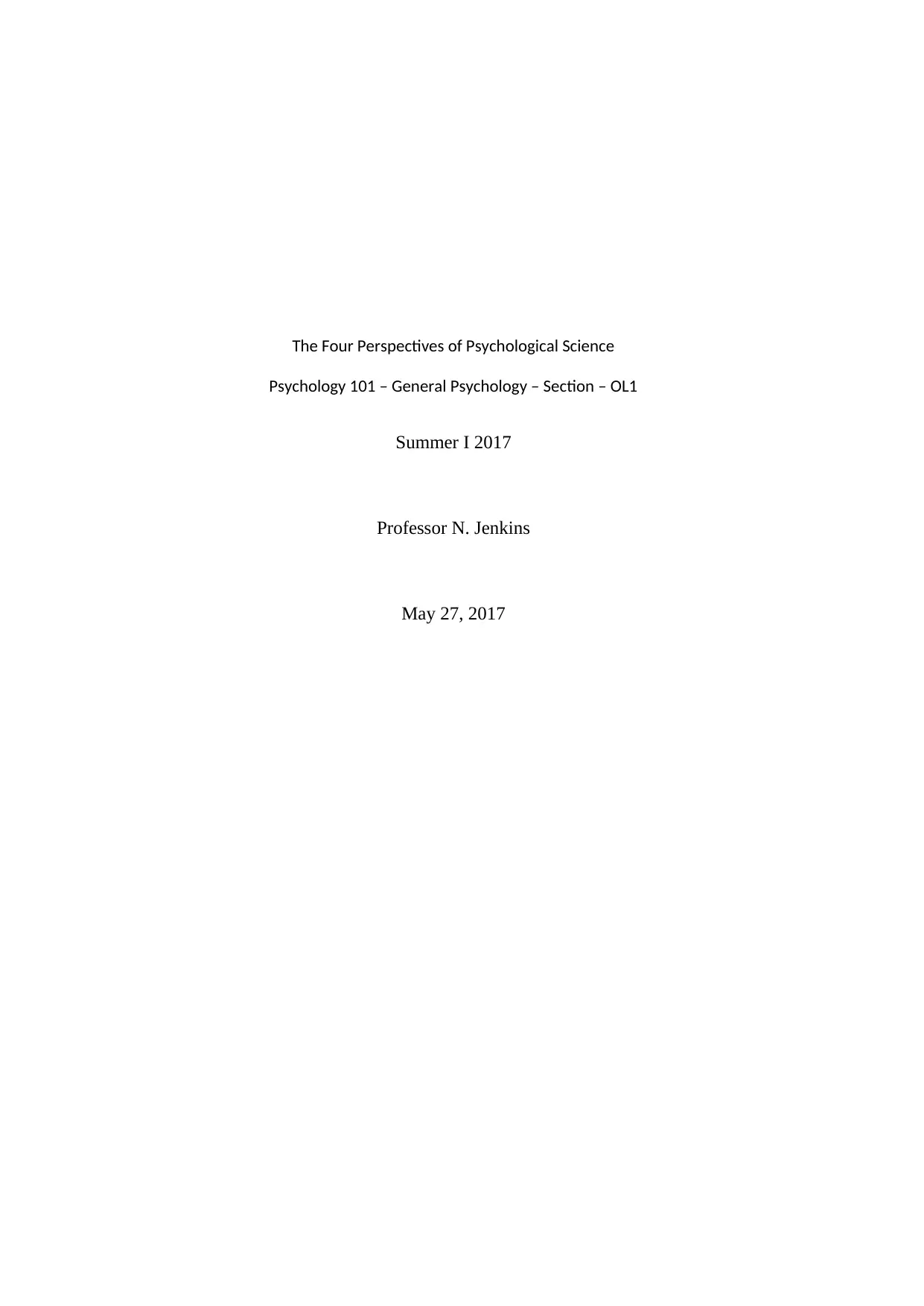
The Four Perspectives of Psychological Science
Psychology 101 – General Psychology – Section – OL1
Summer I 2017
Professor N. Jenkins
May 27, 2017
Psychology 101 – General Psychology – Section – OL1
Summer I 2017
Professor N. Jenkins
May 27, 2017
Paraphrase This Document
Need a fresh take? Get an instant paraphrase of this document with our AI Paraphraser
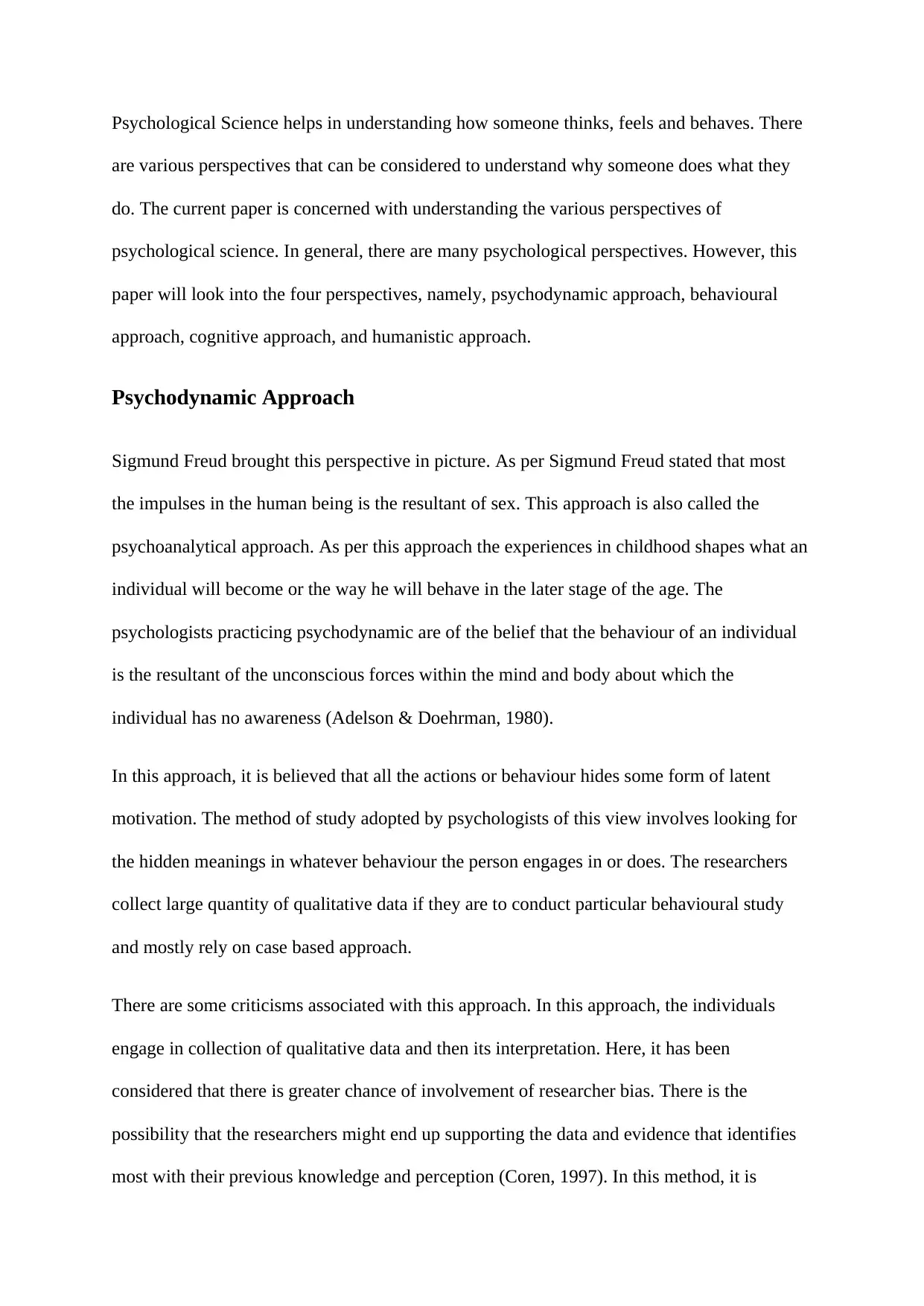
Psychological Science helps in understanding how someone thinks, feels and behaves. There
are various perspectives that can be considered to understand why someone does what they
do. The current paper is concerned with understanding the various perspectives of
psychological science. In general, there are many psychological perspectives. However, this
paper will look into the four perspectives, namely, psychodynamic approach, behavioural
approach, cognitive approach, and humanistic approach.
Psychodynamic Approach
Sigmund Freud brought this perspective in picture. As per Sigmund Freud stated that most
the impulses in the human being is the resultant of sex. This approach is also called the
psychoanalytical approach. As per this approach the experiences in childhood shapes what an
individual will become or the way he will behave in the later stage of the age. The
psychologists practicing psychodynamic are of the belief that the behaviour of an individual
is the resultant of the unconscious forces within the mind and body about which the
individual has no awareness (Adelson & Doehrman, 1980).
In this approach, it is believed that all the actions or behaviour hides some form of latent
motivation. The method of study adopted by psychologists of this view involves looking for
the hidden meanings in whatever behaviour the person engages in or does. The researchers
collect large quantity of qualitative data if they are to conduct particular behavioural study
and mostly rely on case based approach.
There are some criticisms associated with this approach. In this approach, the individuals
engage in collection of qualitative data and then its interpretation. Here, it has been
considered that there is greater chance of involvement of researcher bias. There is the
possibility that the researchers might end up supporting the data and evidence that identifies
most with their previous knowledge and perception (Coren, 1997). In this method, it is
are various perspectives that can be considered to understand why someone does what they
do. The current paper is concerned with understanding the various perspectives of
psychological science. In general, there are many psychological perspectives. However, this
paper will look into the four perspectives, namely, psychodynamic approach, behavioural
approach, cognitive approach, and humanistic approach.
Psychodynamic Approach
Sigmund Freud brought this perspective in picture. As per Sigmund Freud stated that most
the impulses in the human being is the resultant of sex. This approach is also called the
psychoanalytical approach. As per this approach the experiences in childhood shapes what an
individual will become or the way he will behave in the later stage of the age. The
psychologists practicing psychodynamic are of the belief that the behaviour of an individual
is the resultant of the unconscious forces within the mind and body about which the
individual has no awareness (Adelson & Doehrman, 1980).
In this approach, it is believed that all the actions or behaviour hides some form of latent
motivation. The method of study adopted by psychologists of this view involves looking for
the hidden meanings in whatever behaviour the person engages in or does. The researchers
collect large quantity of qualitative data if they are to conduct particular behavioural study
and mostly rely on case based approach.
There are some criticisms associated with this approach. In this approach, the individuals
engage in collection of qualitative data and then its interpretation. Here, it has been
considered that there is greater chance of involvement of researcher bias. There is the
possibility that the researchers might end up supporting the data and evidence that identifies
most with their previous knowledge and perception (Coren, 1997). In this method, it is
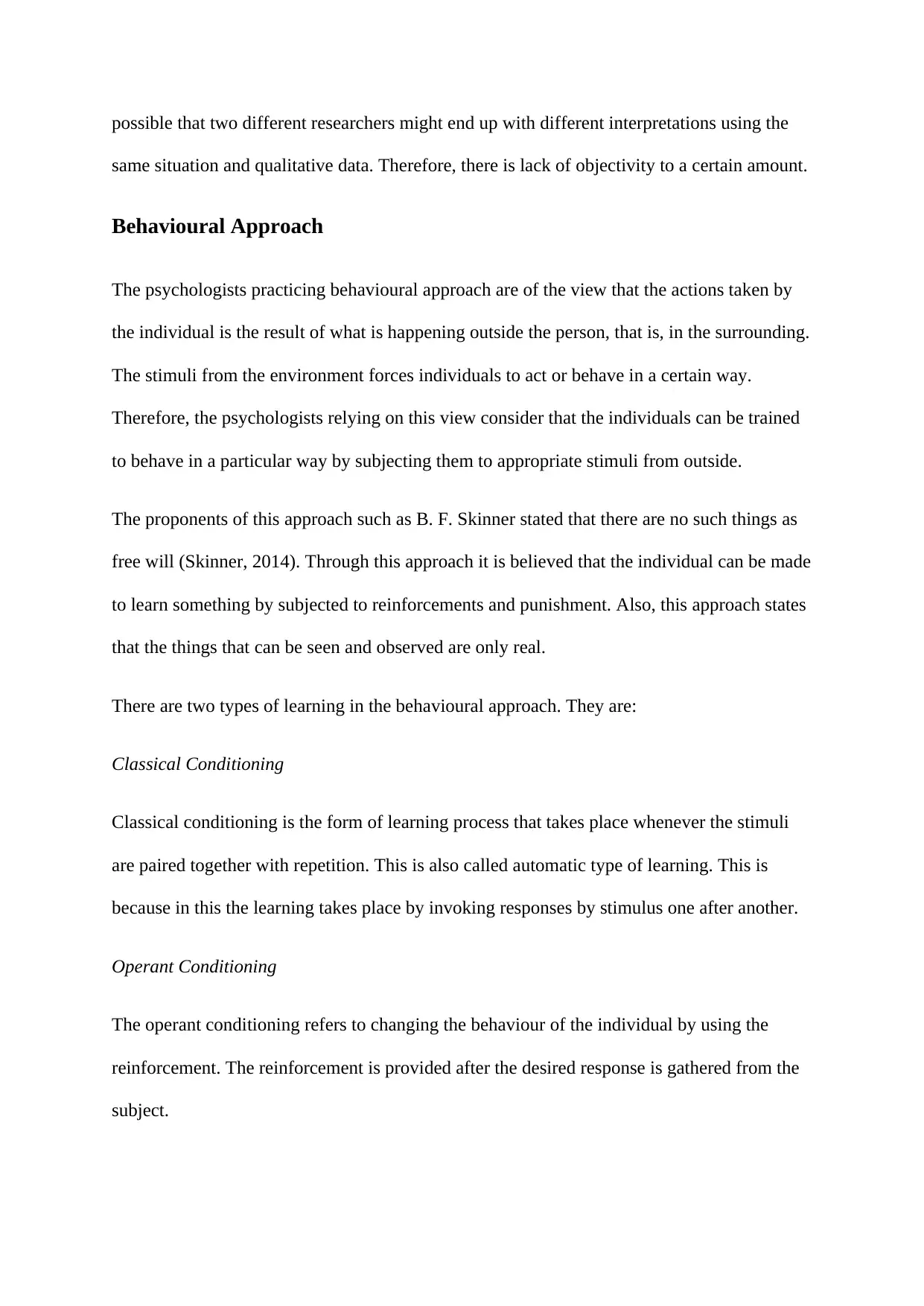
possible that two different researchers might end up with different interpretations using the
same situation and qualitative data. Therefore, there is lack of objectivity to a certain amount.
Behavioural Approach
The psychologists practicing behavioural approach are of the view that the actions taken by
the individual is the result of what is happening outside the person, that is, in the surrounding.
The stimuli from the environment forces individuals to act or behave in a certain way.
Therefore, the psychologists relying on this view consider that the individuals can be trained
to behave in a particular way by subjecting them to appropriate stimuli from outside.
The proponents of this approach such as B. F. Skinner stated that there are no such things as
free will (Skinner, 2014). Through this approach it is believed that the individual can be made
to learn something by subjected to reinforcements and punishment. Also, this approach states
that the things that can be seen and observed are only real.
There are two types of learning in the behavioural approach. They are:
Classical Conditioning
Classical conditioning is the form of learning process that takes place whenever the stimuli
are paired together with repetition. This is also called automatic type of learning. This is
because in this the learning takes place by invoking responses by stimulus one after another.
Operant Conditioning
The operant conditioning refers to changing the behaviour of the individual by using the
reinforcement. The reinforcement is provided after the desired response is gathered from the
subject.
same situation and qualitative data. Therefore, there is lack of objectivity to a certain amount.
Behavioural Approach
The psychologists practicing behavioural approach are of the view that the actions taken by
the individual is the result of what is happening outside the person, that is, in the surrounding.
The stimuli from the environment forces individuals to act or behave in a certain way.
Therefore, the psychologists relying on this view consider that the individuals can be trained
to behave in a particular way by subjecting them to appropriate stimuli from outside.
The proponents of this approach such as B. F. Skinner stated that there are no such things as
free will (Skinner, 2014). Through this approach it is believed that the individual can be made
to learn something by subjected to reinforcements and punishment. Also, this approach states
that the things that can be seen and observed are only real.
There are two types of learning in the behavioural approach. They are:
Classical Conditioning
Classical conditioning is the form of learning process that takes place whenever the stimuli
are paired together with repetition. This is also called automatic type of learning. This is
because in this the learning takes place by invoking responses by stimulus one after another.
Operant Conditioning
The operant conditioning refers to changing the behaviour of the individual by using the
reinforcement. The reinforcement is provided after the desired response is gathered from the
subject.
⊘ This is a preview!⊘
Do you want full access?
Subscribe today to unlock all pages.

Trusted by 1+ million students worldwide
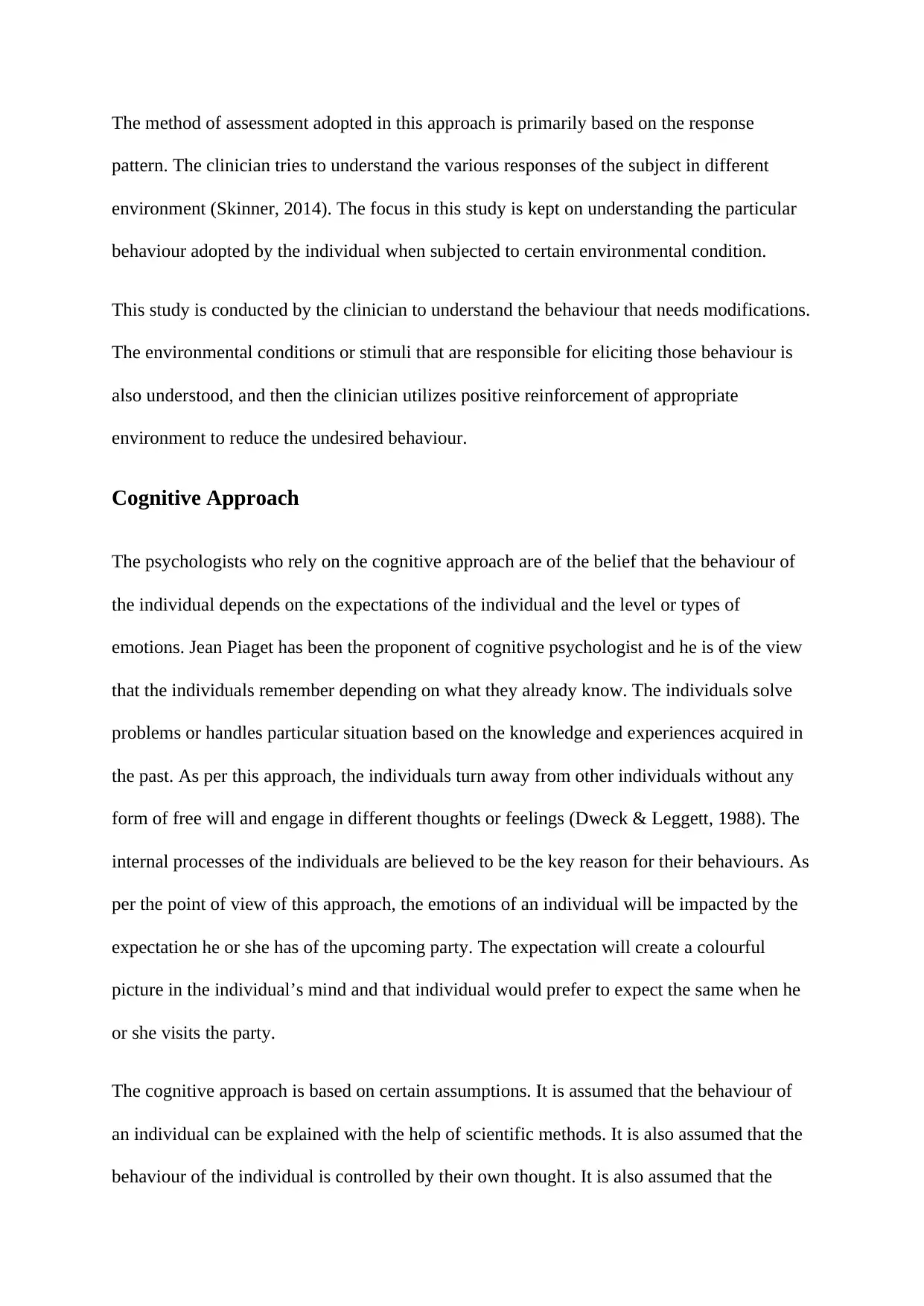
The method of assessment adopted in this approach is primarily based on the response
pattern. The clinician tries to understand the various responses of the subject in different
environment (Skinner, 2014). The focus in this study is kept on understanding the particular
behaviour adopted by the individual when subjected to certain environmental condition.
This study is conducted by the clinician to understand the behaviour that needs modifications.
The environmental conditions or stimuli that are responsible for eliciting those behaviour is
also understood, and then the clinician utilizes positive reinforcement of appropriate
environment to reduce the undesired behaviour.
Cognitive Approach
The psychologists who rely on the cognitive approach are of the belief that the behaviour of
the individual depends on the expectations of the individual and the level or types of
emotions. Jean Piaget has been the proponent of cognitive psychologist and he is of the view
that the individuals remember depending on what they already know. The individuals solve
problems or handles particular situation based on the knowledge and experiences acquired in
the past. As per this approach, the individuals turn away from other individuals without any
form of free will and engage in different thoughts or feelings (Dweck & Leggett, 1988). The
internal processes of the individuals are believed to be the key reason for their behaviours. As
per the point of view of this approach, the emotions of an individual will be impacted by the
expectation he or she has of the upcoming party. The expectation will create a colourful
picture in the individual’s mind and that individual would prefer to expect the same when he
or she visits the party.
The cognitive approach is based on certain assumptions. It is assumed that the behaviour of
an individual can be explained with the help of scientific methods. It is also assumed that the
behaviour of the individual is controlled by their own thought. It is also assumed that the
pattern. The clinician tries to understand the various responses of the subject in different
environment (Skinner, 2014). The focus in this study is kept on understanding the particular
behaviour adopted by the individual when subjected to certain environmental condition.
This study is conducted by the clinician to understand the behaviour that needs modifications.
The environmental conditions or stimuli that are responsible for eliciting those behaviour is
also understood, and then the clinician utilizes positive reinforcement of appropriate
environment to reduce the undesired behaviour.
Cognitive Approach
The psychologists who rely on the cognitive approach are of the belief that the behaviour of
the individual depends on the expectations of the individual and the level or types of
emotions. Jean Piaget has been the proponent of cognitive psychologist and he is of the view
that the individuals remember depending on what they already know. The individuals solve
problems or handles particular situation based on the knowledge and experiences acquired in
the past. As per this approach, the individuals turn away from other individuals without any
form of free will and engage in different thoughts or feelings (Dweck & Leggett, 1988). The
internal processes of the individuals are believed to be the key reason for their behaviours. As
per the point of view of this approach, the emotions of an individual will be impacted by the
expectation he or she has of the upcoming party. The expectation will create a colourful
picture in the individual’s mind and that individual would prefer to expect the same when he
or she visits the party.
The cognitive approach is based on certain assumptions. It is assumed that the behaviour of
an individual can be explained with the help of scientific methods. It is also assumed that the
behaviour of the individual is controlled by their own thought. It is also assumed that the
Paraphrase This Document
Need a fresh take? Get an instant paraphrase of this document with our AI Paraphraser
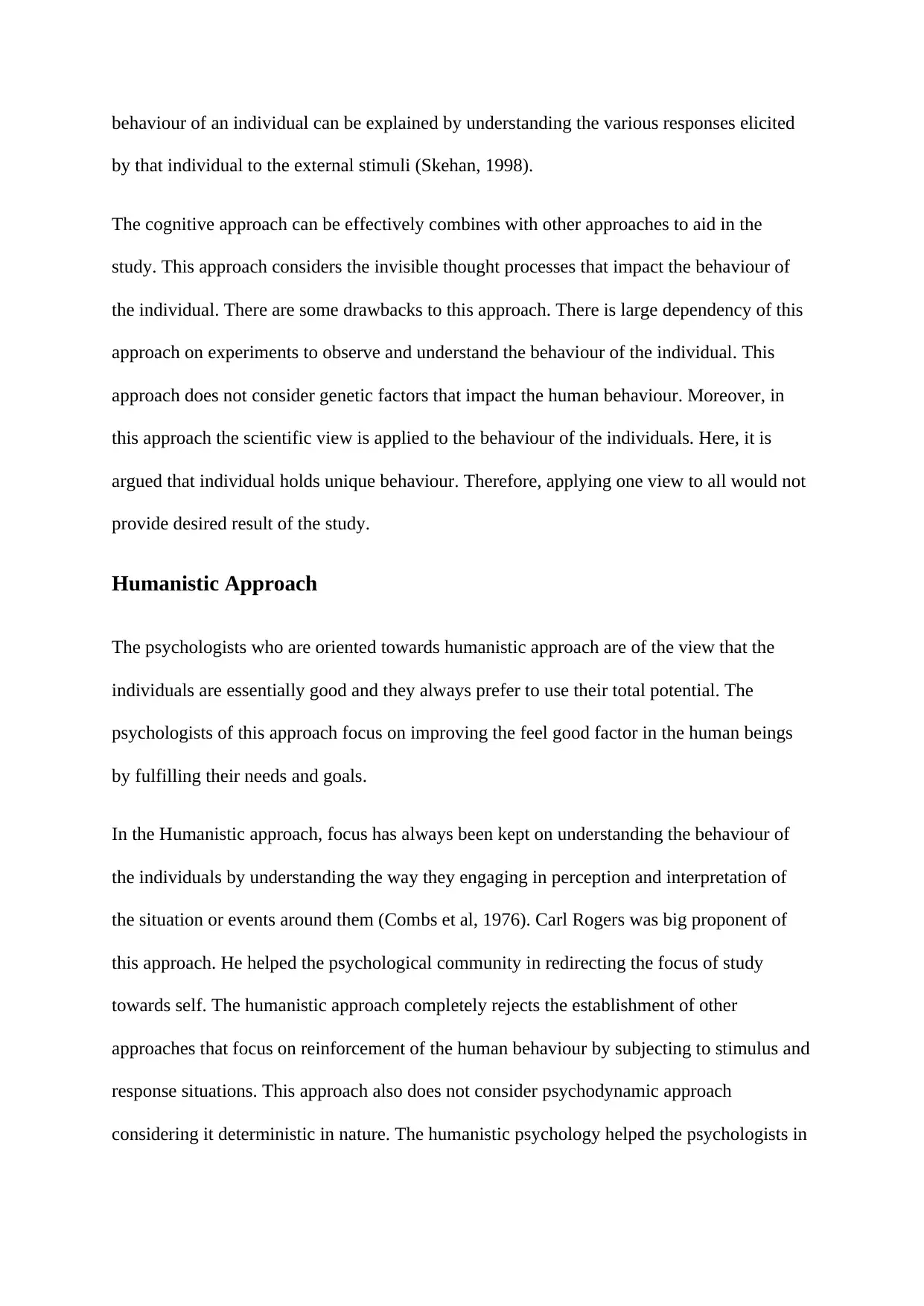
behaviour of an individual can be explained by understanding the various responses elicited
by that individual to the external stimuli (Skehan, 1998).
The cognitive approach can be effectively combines with other approaches to aid in the
study. This approach considers the invisible thought processes that impact the behaviour of
the individual. There are some drawbacks to this approach. There is large dependency of this
approach on experiments to observe and understand the behaviour of the individual. This
approach does not consider genetic factors that impact the human behaviour. Moreover, in
this approach the scientific view is applied to the behaviour of the individuals. Here, it is
argued that individual holds unique behaviour. Therefore, applying one view to all would not
provide desired result of the study.
Humanistic Approach
The psychologists who are oriented towards humanistic approach are of the view that the
individuals are essentially good and they always prefer to use their total potential. The
psychologists of this approach focus on improving the feel good factor in the human beings
by fulfilling their needs and goals.
In the Humanistic approach, focus has always been kept on understanding the behaviour of
the individuals by understanding the way they engaging in perception and interpretation of
the situation or events around them (Combs et al, 1976). Carl Rogers was big proponent of
this approach. He helped the psychological community in redirecting the focus of study
towards self. The humanistic approach completely rejects the establishment of other
approaches that focus on reinforcement of the human behaviour by subjecting to stimulus and
response situations. This approach also does not consider psychodynamic approach
considering it deterministic in nature. The humanistic psychology helped the psychologists in
by that individual to the external stimuli (Skehan, 1998).
The cognitive approach can be effectively combines with other approaches to aid in the
study. This approach considers the invisible thought processes that impact the behaviour of
the individual. There are some drawbacks to this approach. There is large dependency of this
approach on experiments to observe and understand the behaviour of the individual. This
approach does not consider genetic factors that impact the human behaviour. Moreover, in
this approach the scientific view is applied to the behaviour of the individuals. Here, it is
argued that individual holds unique behaviour. Therefore, applying one view to all would not
provide desired result of the study.
Humanistic Approach
The psychologists who are oriented towards humanistic approach are of the view that the
individuals are essentially good and they always prefer to use their total potential. The
psychologists of this approach focus on improving the feel good factor in the human beings
by fulfilling their needs and goals.
In the Humanistic approach, focus has always been kept on understanding the behaviour of
the individuals by understanding the way they engaging in perception and interpretation of
the situation or events around them (Combs et al, 1976). Carl Rogers was big proponent of
this approach. He helped the psychological community in redirecting the focus of study
towards self. The humanistic approach completely rejects the establishment of other
approaches that focus on reinforcement of the human behaviour by subjecting to stimulus and
response situations. This approach also does not consider psychodynamic approach
considering it deterministic in nature. The humanistic psychology helped the psychologists in
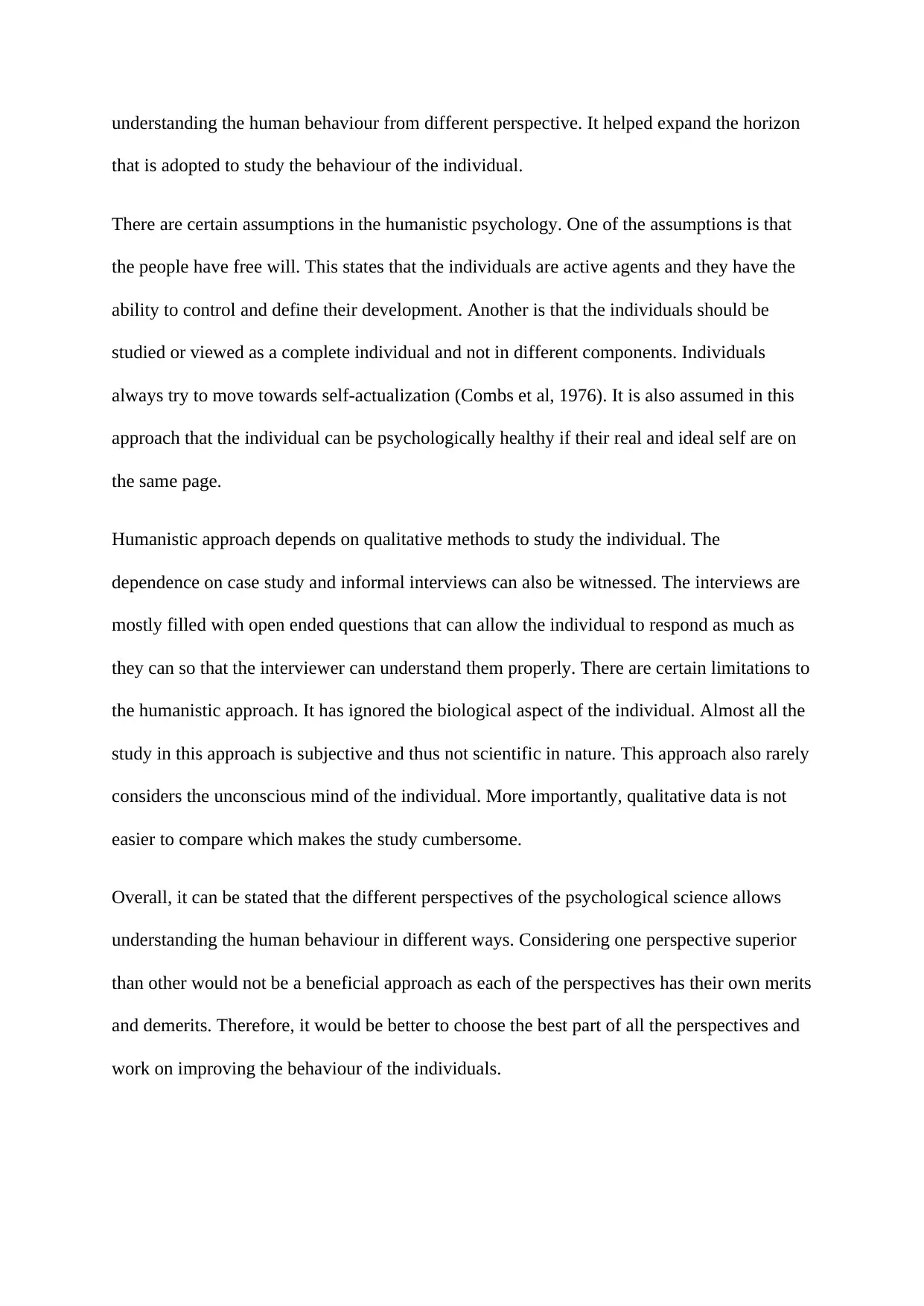
understanding the human behaviour from different perspective. It helped expand the horizon
that is adopted to study the behaviour of the individual.
There are certain assumptions in the humanistic psychology. One of the assumptions is that
the people have free will. This states that the individuals are active agents and they have the
ability to control and define their development. Another is that the individuals should be
studied or viewed as a complete individual and not in different components. Individuals
always try to move towards self-actualization (Combs et al, 1976). It is also assumed in this
approach that the individual can be psychologically healthy if their real and ideal self are on
the same page.
Humanistic approach depends on qualitative methods to study the individual. The
dependence on case study and informal interviews can also be witnessed. The interviews are
mostly filled with open ended questions that can allow the individual to respond as much as
they can so that the interviewer can understand them properly. There are certain limitations to
the humanistic approach. It has ignored the biological aspect of the individual. Almost all the
study in this approach is subjective and thus not scientific in nature. This approach also rarely
considers the unconscious mind of the individual. More importantly, qualitative data is not
easier to compare which makes the study cumbersome.
Overall, it can be stated that the different perspectives of the psychological science allows
understanding the human behaviour in different ways. Considering one perspective superior
than other would not be a beneficial approach as each of the perspectives has their own merits
and demerits. Therefore, it would be better to choose the best part of all the perspectives and
work on improving the behaviour of the individuals.
that is adopted to study the behaviour of the individual.
There are certain assumptions in the humanistic psychology. One of the assumptions is that
the people have free will. This states that the individuals are active agents and they have the
ability to control and define their development. Another is that the individuals should be
studied or viewed as a complete individual and not in different components. Individuals
always try to move towards self-actualization (Combs et al, 1976). It is also assumed in this
approach that the individual can be psychologically healthy if their real and ideal self are on
the same page.
Humanistic approach depends on qualitative methods to study the individual. The
dependence on case study and informal interviews can also be witnessed. The interviews are
mostly filled with open ended questions that can allow the individual to respond as much as
they can so that the interviewer can understand them properly. There are certain limitations to
the humanistic approach. It has ignored the biological aspect of the individual. Almost all the
study in this approach is subjective and thus not scientific in nature. This approach also rarely
considers the unconscious mind of the individual. More importantly, qualitative data is not
easier to compare which makes the study cumbersome.
Overall, it can be stated that the different perspectives of the psychological science allows
understanding the human behaviour in different ways. Considering one perspective superior
than other would not be a beneficial approach as each of the perspectives has their own merits
and demerits. Therefore, it would be better to choose the best part of all the perspectives and
work on improving the behaviour of the individuals.
⊘ This is a preview!⊘
Do you want full access?
Subscribe today to unlock all pages.

Trusted by 1+ million students worldwide
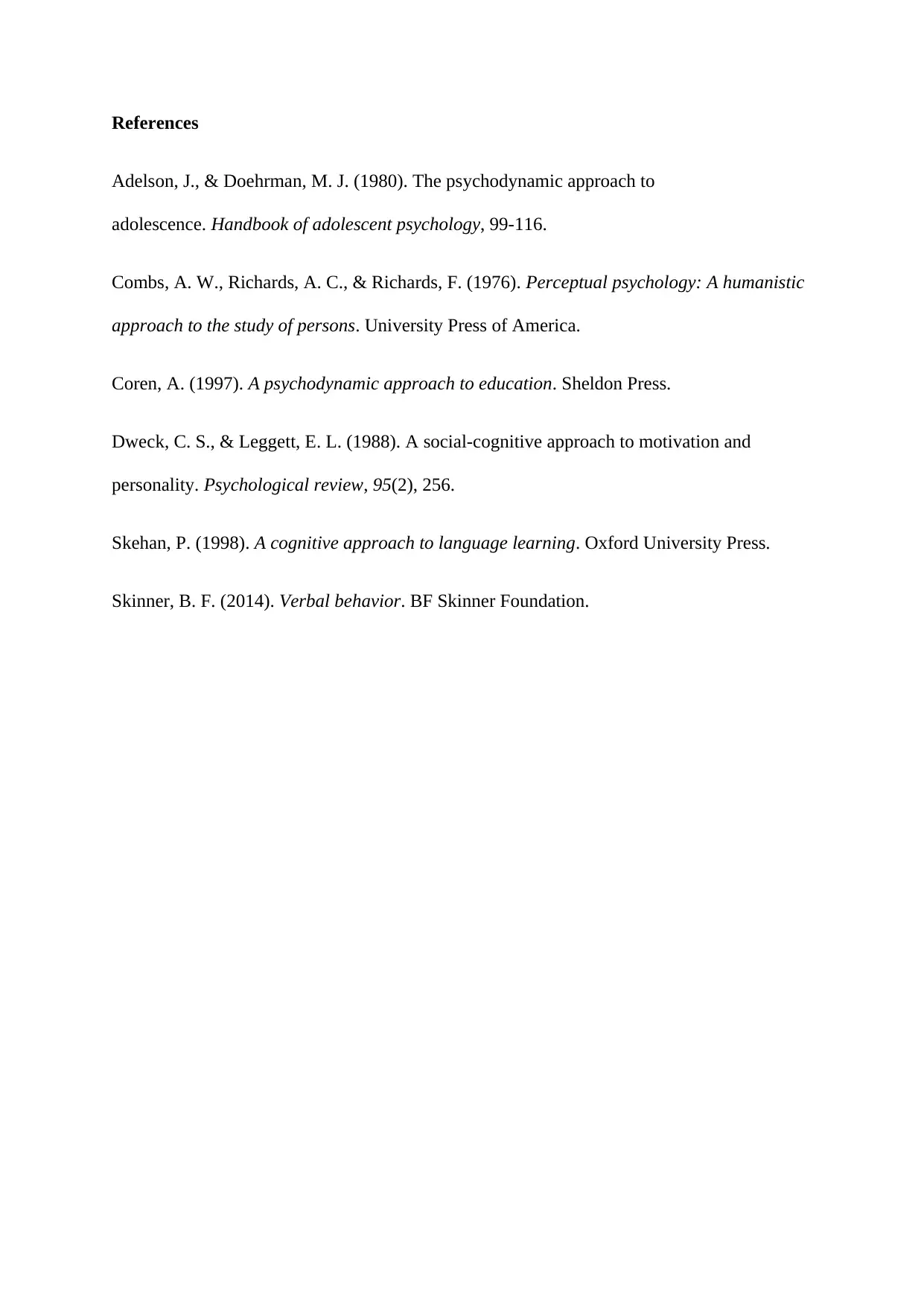
References
Adelson, J., & Doehrman, M. J. (1980). The psychodynamic approach to
adolescence. Handbook of adolescent psychology, 99-116.
Combs, A. W., Richards, A. C., & Richards, F. (1976). Perceptual psychology: A humanistic
approach to the study of persons. University Press of America.
Coren, A. (1997). A psychodynamic approach to education. Sheldon Press.
Dweck, C. S., & Leggett, E. L. (1988). A social-cognitive approach to motivation and
personality. Psychological review, 95(2), 256.
Skehan, P. (1998). A cognitive approach to language learning. Oxford University Press.
Skinner, B. F. (2014). Verbal behavior. BF Skinner Foundation.
Adelson, J., & Doehrman, M. J. (1980). The psychodynamic approach to
adolescence. Handbook of adolescent psychology, 99-116.
Combs, A. W., Richards, A. C., & Richards, F. (1976). Perceptual psychology: A humanistic
approach to the study of persons. University Press of America.
Coren, A. (1997). A psychodynamic approach to education. Sheldon Press.
Dweck, C. S., & Leggett, E. L. (1988). A social-cognitive approach to motivation and
personality. Psychological review, 95(2), 256.
Skehan, P. (1998). A cognitive approach to language learning. Oxford University Press.
Skinner, B. F. (2014). Verbal behavior. BF Skinner Foundation.
1 out of 7
Related Documents
Your All-in-One AI-Powered Toolkit for Academic Success.
+13062052269
info@desklib.com
Available 24*7 on WhatsApp / Email
![[object Object]](/_next/static/media/star-bottom.7253800d.svg)
Unlock your academic potential
Copyright © 2020–2026 A2Z Services. All Rights Reserved. Developed and managed by ZUCOL.





